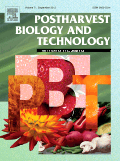
POSTHARVEST BIOLOGY AND TECHNOLOGY
Scope & Guideline
Enhancing Shelf Life: Where Biology Meets Technology
Introduction
Aims and Scopes
- Postharvest Physiology and Biochemistry:
Research in this area explores the physiological and biochemical processes that fruits and vegetables undergo after harvest, including ripening, senescence, and responses to storage conditions. This understanding is crucial for developing methods to maintain quality and extend shelf life. - Disease Management and Biocontrol Strategies:
The journal publishes studies on the mechanisms of postharvest diseases and innovative biocontrol strategies, including the use of microbial agents, natural compounds, and physical treatments to mitigate decay and extend the storage life of produce. - Quality Assessment and Sensory Evaluation:
Research focusing on the evaluation of quality attributes, sensory characteristics, and consumer acceptance of postharvest products. This includes non-destructive testing methods such as spectroscopy and imaging techniques. - Innovative Preservation Technologies:
The journal highlights advancements in packaging technologies, including modified atmosphere packaging, edible coatings, and the use of nanomaterials to enhance the preservation of fruits and vegetables. - Molecular and Genetic Approaches:
Studies involving genetic and molecular analysis to understand the mechanisms of postharvest processes, including the regulation of metabolic pathways and gene expression that influence fruit quality and resistance to chilling injury.
Trending and Emerging
- Sustainable and Eco-Friendly Practices:
Research is increasingly focusing on sustainable practices, including the use of biodegradable packaging materials, natural biocontrol agents, and organic treatments to enhance produce quality while minimizing environmental impact. - Advanced Imaging and Spectroscopy Techniques:
There is a growing interest in non-destructive methods for quality assessment, such as hyperspectral imaging and machine learning algorithms, which allow for rapid and accurate evaluation of fruit quality. - Molecular Biology and Genetic Engineering:
Emerging studies are focusing on the genetic and molecular mechanisms underlying postharvest processes, including the use of CRISPR technology and other genetic modifications to enhance fruit quality and shelf life. - Integration of Artificial Intelligence in Postharvest Systems:
The application of AI and machine learning in predicting postharvest quality, monitoring storage conditions, and automating sorting processes is becoming increasingly prevalent. - Microbiome Research in Postharvest Management:
Exploration of the fruit microbiome and its influence on postharvest quality and decay resistance is a burgeoning area of research, with implications for biocontrol strategies and quality maintenance.
Declining or Waning
- Traditional Chemical Treatments:
There has been a noticeable decline in studies focused solely on chemical treatments for postharvest preservation, likely due to increasing consumer demand for organic and natural solutions. - Conventional Storage Techniques:
Research on conventional storage methods is waning as innovative technologies such as controlled atmosphere storage and smart packaging solutions gain traction in the field. - General Reviews on Postharvest Practices:
The journal has shifted towards more specialized articles and innovative techniques, leading to a decrease in broad review articles that summarize various postharvest practices.
Similar Journals
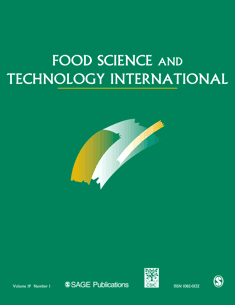
FOOD SCIENCE AND TECHNOLOGY INTERNATIONAL
Fostering knowledge and innovation in food science.FOOD SCIENCE AND TECHNOLOGY INTERNATIONAL, published by SAGE Publications Ltd, is a premier journal in the fields of food science and technology, serving as a crucial platform for the dissemination of innovative research and practical applications from 1995 through to 2024. With an impact factor reflecting its significant standing—ranking in the Q2 quartile for Chemical Engineering, Food Science, and Industrial and Manufacturing Engineering—this journal plays an instrumental role in advancing the interdisciplinary study of food systems. Researchers, professionals, and students can access high-quality contributions that address the latest developments and trends in food technology, safety, and processing. Located in the United States, FOOD SCIENCE AND TECHNOLOGY INTERNATIONAL also boasts commendable Scopus rankings, ensuring its articles are both relevant and widely cited within the academic community. As a vital resource for anyone engaged in food science research, этот журнал fosters knowledge sharing and innovation in the ever-evolving landscape of food technology.

AMERICAN JOURNAL OF POTATO RESEARCH
Nurturing Collaboration in Potato ScienceAMERICAN JOURNAL OF POTATO RESEARCH is a prominent scholarly journal dedicated to the field of potato research, encompassing vital areas of Agronomy and Crop Science. Published by SPRINGER, this journal holds an impactful presence in the scientific community, as evidenced by its placement in the Q2 quartile of both Agronomy and Plant Science categories for 2023. With a Scopus rank of #145 out of 406 in Agricultural and Biological Sciences, it offers a significant platform for researchers, professionals, and students alike. Covering diverse topics from cultivation techniques to pest management, the journal aims to advance understanding and innovation in potato science, facilitating the sharing of cutting-edge research and fostering collaboration among scholars. Accessible to a global audience, the journal encourages the dissemination of knowledge through its open-access options. Since its inception in 1998, the AMERICAN JOURNAL OF POTATO RESEARCH has been committed to contributing valuable insights that drive the industry forward and support sustainable agricultural practices.

JOURNAL OF FOOD SCIENCE AND TECHNOLOGY-MYSORE
Driving Progress in Food Science for a Healthier WorldJOURNAL OF FOOD SCIENCE AND TECHNOLOGY-MYSORE, published by SPRINGER INDIA, is a distinguished peer-reviewed journal that has been contributing to the ever-evolving field of food science since its inception in 1974. With an ISSN of 0022-1155 and E-ISSN 0975-8402, this journal holds a commendable position in the Q2 category for Food Science, as per the 2023 metrics, and ranks #58 out of 389 in Scopus's Agricultural and Biological Sciences sector, achieving an impressive 85th percentile. The journal publishes high-quality research articles, reviews, and case studies that cover a wide array of topics, from food preservation to innovative technologies in food processing. Although it is not an open-access journal, it endeavors to disseminate essential knowledge and research strategies that advance food science and benefit both industry professionals and academia. The geographical reach of the journal, alongside its rigorous editorial standards, solidifies its stature as a pivotal resource for researchers, professionals, and students dedicated to the enhancement of food science practices and technologies.

Journal of Berry Research
Unraveling the Secrets of Berry BenefitsJournal of Berry Research, published by IOS PRESS, is an essential scholarly platform that addresses a wide array of topics related to the health benefits, cultivation, and innovation surrounding berry species. With an ISSN of 1878-5093 and an E-ISSN of 1878-5123, this journal has successfully carved a niche in various interdisciplinary fields, achieving notable rankings in its respective categories, including Q2 in Agronomy and Crop Science and Q3 in Biochemistry and Food Science as of 2023. The journal not only serves as a repository of rigorous research but also facilitates the exchange of knowledge among researchers, professionals, and students invested in agronomy, horticulture, and plant science. The HIndex reflects its growing impact within these disciplines. Set against the backdrop of the Netherlands since its inception in 2010, the Journal of Berry Research continues to provide cutting-edge insights, making it a pivotal resource for those pursuing advances in berry research and its associated fields.
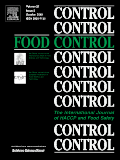
FOOD CONTROL
Exploring the nexus of safety, quality, and sustainability.FOOD CONTROL, published by Elsevier Science Ltd, stands at the forefront of research in the fields of Food Science and Biotechnology, holding a prestigious Q1 ranking in both categories as of 2023. With an impact factor reflecting its influential role in the scientific community, this journal is dedicated to advancing the understanding and control of food safety, quality, and regulations from 1990 to its projected convergence in 2025. Food Control provides a platform for innovative research and critical reviews that address the pressing global challenges in food safety, sustainability, and technological advancements in the industry. Researchers, professionals, and students are encouraged to engage with its content, fostering a deeper understanding of the intersection between food science and biotechnological advancements, all while benefiting from the extensive reach of its Scopus rankings, which place it in the top 5th percentile of its respective fields.

JOURNAL OF STORED PRODUCTS RESEARCH
Unraveling the Secrets of Stored Product ScienceJOURNAL OF STORED PRODUCTS RESEARCH, published by PERGAMON-ELSEVIER SCIENCE LTD, is a leading academic journal in the fields of Agronomy and Crop Science, Food Science, Horticulture, and Insect Science. With ISSN 0022-474X and E-ISSN 1879-1212, this journal has been a cornerstone of research since its inception in 1965 and continues to contribute valuable insights into the science of stored products through its rigorous peer-reviewed articles. Recognized in 2023 with top rankings in various categories (Q1 in Agronomy and Crop Science, and Horticulture; Q2 in Food Science), its commitment to addressing the challenges in the preservation and quality of stored products is reflected in its substantial impact factor and robust Scopus rankings. Although it does not operate under Open Access, the journal remains crucial for professionals and researchers seeking to advance their understanding and application of stored product science. Located in the United Kingdom, at The Boulevard, Langford Lane, Kidlington, Oxford OX5 1GB, England, the journal stands as a pivotal resource for those committed to enhancing agricultural sustainability and food security.
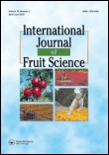
International Journal of Fruit Science
Connecting scholars to the forefront of horticultural research.International Journal of Fruit Science, published by TAYLOR & FRANCIS INC, is a preeminent platform for the dissemination of high-quality research in the fields of Agronomy, Horticulture, Ecology, and Plant Science. With an impressive track record since its inception in 2005 and ongoing convergence up to 2024, this journal serves as a vital resource for scholars and industry professionals alike. Renowned for its rigorous peer-review process and comprehensive publication of cutting-edge studies, it holds a distinguished position in multiple Scopus rankings, including a top 10 placement in Horticulture (Rank #8/115) and notable percentiles, reflecting its significant impact in the academic community. Researchers can delve into critical insights related to fruit cultivation, genetics, and sustainability, bolstered by its Q1 and Q2 quartile standings across various categories. Though the journal is not open access, it remains an essential read for those intent on advancing knowledge and practices within the rapidly evolving landscape of fruit science.

ACTA PHYSIOLOGIAE PLANTARUM
Fostering impactful discussions on plant health and sustainability.ACTA PHYSIOLOGIAE PLANTARUM, published by Springer Heidelberg, is a leading journal dedicated to advancing the fields of Agronomy, Plant Science, and Physiology. With an ISSN of 0137-5881 and an E-ISSN of 1861-1664, this esteemed publication has a significant global outreach, being based in Germany. The journal is recognized for its impactful contributions, currently holding a Q2 ranking in both Agronomy and Crop Science, as well as Plant Science, and a Q3 ranking in Physiology according to 2023 category quartiles. Its Scopus rankings reflect its reputable standing within the academic community, with notable placements in Agricultural and Biological Sciences, further highlighting its importance for researchers and professionals in the field. The objective of ACTA PHYSIOLOGIAE PLANTARUM is to foster robust discussions and disseminate innovative studies that enhance our understanding of plant physiology and its applications. Though not an open-access journal, it provides comprehensive access options for readers keen on exploring cutting-edge research that drives advancements in agricultural productivity and sustainability. Through its dedication to excellence, this journal continues to be a vital resource for advancing knowledge and practices in plant sciences.
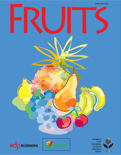
Fruits
Connecting Global Experts in Horticultural Research.Fruits, published by the International Society for Horticultural Science (ISHS), is a pivotal journal in the fields of Agronomy, Food Science, and Horticulture. Since its inception in 1995 and with a continued publication from 2001 to 2024, this journal provides a platform for innovative research and advancements related to fruit science, covering an array of topics from cultivation techniques to post-harvest processing. With an ISSN number of 0248-1294 and an E-ISSN of 1625-967X, *Fruits* engages a global audience, operating out of France and serving as a vital resource for academics, industry professionals, and students alike. Despite its current categorization as Q4 in Agronomy and Crop Science and Q3 in both Food Science and Horticulture, the journal is committed to fostering high-quality research and enhancing its visibility within the academia, as reflected in its Scopus rankings. Readers can expect rigorous peer-reviewed articles that contribute significantly to the understanding of fruit-related science, ultimately driving the advancement of sustainable practices in the field. Emphasizing accessibility, while currently not open access, *Fruits* remains dedicated to disseminating valuable knowledge to enhance the communal pursuit of excellence in horticultural research.

Horticulturae, an esteemed open-access journal published by MDPI, is at the forefront of horticultural science, showcasing innovative research and advancements in the field since its inception in 2015. With its base in Switzerland, this journal operates under the ethos of global accessibility, allowing researchers, professionals, and students to share and disseminate critical findings without barriers. Horticulturae holds a distinguished Q1 ranking in Horticulture and Q2 in Plant Science, as reported in the 2023 categorizations, highlighting its impactful contributions to the scientific community. The journal features rigorous peer-reviewed articles covering a wide range of topics, including plant physiology, crop production, and sustainable practices, making it a vital resource for anyone engaged in gardening, agronomy, and environmental science. As it converges its focus from 2015 to 2024, Horticulturae not only aims to further academic discourse but also aligns with the growing need for research pertaining to biodiversity and sustainable agriculture, thus ensuring relevance in an ever-evolving field.